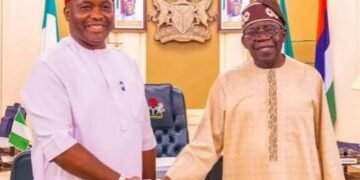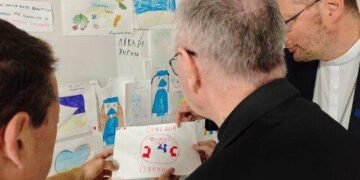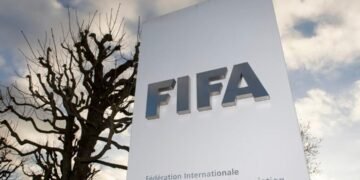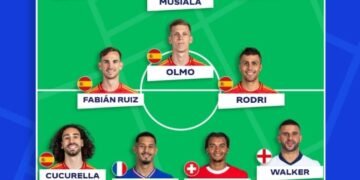By Paul Chika Emekwulu
What I call vowel interchange is neither new nor a syllabus item and is real. In other words, vowel interchange as a topic is not a part of Igbo Language curriculum neither at the primary level nor at the secondary level.Should it be? Of course, the answer is yes. But first what is this vowel interchange? Hold your thoughts for you will get to know what it is all about as we continue.
But first this: There are eight vowels in Igbo Language namely: a, e, i, ị, u, ụ, o, and ọ. Good attention has to be paid to u and ụ, o and ọ, i and ị for proper sense impression. This is also to ensure that words are spelt the way they should be spelt, written the way they should be written, and pronounced the way they should be pronounced. When this is done, sense impression is assured both in written and spoken modes of expression.
Moreover, in any language it is only when those conditions are met that your speech starts getting closer to that of the native speaker and that is when you start being understood by the majority.
If honesty counts, vowel interchange leads to spelling errors even though it sounds right to the ear. Anytime, anywhere there is vowel interchange, a spelling error has occurred and of course, metaphorically, a crime has been committed as well. Because of the structural similarity between most letters of the English and Igbo alphabets, we don’t have the right or even the privilege to spell any Igbo word as in English and end up pronouncing same as in Igbo.
Usually that is what happens whenever vowel interchange occurs. Doing so is language manipulation, pure disrespect and sheer dishonesty towards the Igbo Language. At times it is a planned negligence.
Now, at this point let’s look in detail at what vowel interchange is all about.
To do this successfully we’ve three cases to consider as stated hereunder:
Case 1: When u is interchanged for ụ
Case 2: When o is interchanged for ọ
Case 3: When i is interchanged for ị
Now, the above cases in detail:
Case 1:
When you write down the following letters of the Igbo alphabets: N, d, u, k, a and pull them together to make a name now rightly spelt and pronounced to sound as Ndụka, you are interchanging u for ụ. That is totally wrong and should not be tolerated.
Case 2:
When you write down the following letters of the Igbo alphabets: O, k, ọ, n, k, w, o and pull them together to make a name now rightly spelt and pronounced to sound as Okonkwọ, you are interchanging o for ọ. That is totally wrong and should not be tolerated.
Case 3:
When you write down the following letters of the Igbo alphabets: I, n, o, m, a and pull them together to make a name now rightly spelt and pronounced to sound as Ịnọma, you are interchanging o for ọ and you are also interchanging i for ị. That is totally wrong and should also not be tolerated.
Some people are of a different opinion, busy asking whether vowel interchange really matters. Personally, the answer is, “Yes, vowel interchange matters for the sake of sense impression.”
Vowel interchange, among others, are different forms of dishonesty, disrespect towards the Igbo Language and language manipulation as mentioned earlier
This cannot be said enough. Whenever there is an interchange of vowels, metaphorically, a crime has been committed as mentioned earlier. This cannot be said enough as well. This crime is being committed every day, everywhere: It is being committed at the banks, hospitals, schools, Churches, businesses, motor parks, police stations, streets and markets etc. Graphic designers and artists are among the worst offenders. Vowel interchange therefore occurs every day and everywhere and the ability to notice its presence is a function of our level of sensitivity towards the problems staring the Igbo Language in the face.
Listen to this story.
On the 4th of January, 2023, I was at the third gas filling station to fill my gas cylinder having been unsuccessful at two other stations previously, when a woman drove by with some children in the back seat of her car. Being a road side filling station, I was clearly exposed to a direction road sign board out on the road. As a popular street in town where I pass through frequently, I noticed a spelling error in the names of the towns displayed on the board. I’ve never had the opportunity to discuss this observation in detail with anyone. You can now imagine my level of excitement. I was so excited and ready to share. This, as usual, became a teachable moment.
Pointing at the board I said: “Look at that!”
“What’s wrong?” the woman asked.
“Look at how the names of those towns were spelt,” I said to her.
Surprisingly, to her, there was nothing wrong with how the town for example,
Agụlụ was spelt as Agulu. To her also there was nothing wrong with how the town Isuọfịa was spelt as Isuofia. ” The towns Oko and Awka have no problem,” I pointed out. She regarded these for some seconds before continuing. All these are the names of towns on the board.
Pointing at the board she finally asked: “Are you talking about Awka-etiti?”
“No,” I said. “Leave Awka-etiti alone and look at Isuofia and Agulu.”
Oko is correct and Awka is correct,” I continued.
Having said this I kept quiet to see if she would identify the problem unaided as initially intended but she didn’t.
“Something is wrong with the spelling of those towns,” I finally said.
The situation caught the attention of two bystanders. One was a girl standing at an adjacent business on my left and the second was a man who was transferring a gas cylinder from inside the shop to somewhere outside the shop. He stopped everything he was doing and watched everything all in silence. After a while he left and went back to business still without uttering a word. I hope he learnt something.
I have to point out again here, though somehow differently, that in any language if you don’t write words the way they should be written, they will not be spelt the way they should be spelt and when they are not spelt the way they should be spelt, they will not be pronounced the way they should be pronounced and when they are not pronounced the way they should be pronounced, you start being misunderstood by the majority of the native speakers.
Now, in Igbo land, as individuals and groups we are very dishonest and disrespectful towards our language. If we really want to be honest with our language and as far as vowel interchange is concerned, whenever we pronounce any of the letters o, u and i, let each letter sound remain unchanged e.g. Igboukwu and Isuofia. In some cases if we do so, there is no reason why we will not sound like a toddler learning how to speak for the very first time.
Now, where is the much talked about dishonesty? If we are honest, the dishonesty lies in the fact that we are pronouncing the letter “ọ” in Igboukwu and what was supposed to be “ọ” in Isuofia as if they were the same letters when they are not. So, if we are honest there is no reason why the letter “o” in Igboukwu and the letter “o” in Isuofia should not have the same letter sound.
Anything different is nothing but exposing our sheer dishonesty towards a language.
More examples are as follows:
(a) Udoji and Aguata
(b) Udoka and Umuaka
(c) Uche and Ukwuoma
(d) Uchunwa and Uloma
(e) Uchechi and Uduchukwu
If we are honest there is no reason why the letter “i” in Achina and the same letter in Ichida should not sound the same, otherwise, we are cultivating and encouraging dishonesty towards a language and we know it. Some of us are feigning ignorance.
Yet, here are more examples:
(a) Nnewi and Okija
(b) Amesi and Ihembosi
(c) Ezinifite and Akwaihedi
(d) Ndike and Aziza (broom)
(e) Ikenga and Aki (palm kernel nut)
Similarly, if we are honest there is no reason why the “u” in Ula (wrongly and intentionally written) and the “u” in Umuchu (again, also wrongly and intentionally written) should not sound the same, otherwise, we are cultivating and encouraging dishonesty and disrespect towards a language.
We are encouraging dishonesty and disrespect towards the Igbo Language in our schools, in our homes, in our streets, in our hospitals, in our banks, at our markets, in our businesses, at our medical cllnics and at our prisons etc.
This explains why it is everywhere and people exhibit laissez-faire attitude towards it. It becomes an “everybody is doing it” type of thing, join the bandwagon. Someone said that vowel interchange is normal and people are used to it.
Why is that for other languages especially English, we the Igbo Language native speakers pay close attention to all the rules of grammar because if wrongly written we attract public ridicule in addition to being poorly graded by the teacher but for Igbo Language, these rules don’t apply? Why?
Still, here are more examples:
(a) Nnobi and Oba
(b) Oko and Nnokwa
(c) Ojoto and Ozubulu
(d) Ndowu and Akokwa
(e) Obigbo and Umuona
When you as an individual write down names, places and things etc. in Igbo Language, interchanging u for ụ, interchanging i for ị, interchanging o for ọ, I call that individual dishonesty and people have the right to pronounce these names, places and things etc. as they so desire without regard to sense impression.
When so many are involved in this practice, and so many are, I call that collective dishonesty and both have to be discouraged –
But the question is still:
What about sense impression? For example, pronouncing Ojoto with the letter “o” sounding like the letter “o” in O-z-u-b-u-l-u (all spelt out as in English and of course pronounced alike) and of course with the letter “o” sounding like the letter “o” in Ojoto.
If disrespect and dishonesty towards the Igbo language (and vowel interchange is one of them) were to be a crime punishable under the law, financial institutions, Churches, advertisers, graphic designers, businesses, politicians, the media (radio, newspapers and magazine editors etc.), authors, printers, academic institutions, and of course, most other ndividuals and groups will be serving different prison sentences depending on the severity of the disrespect and dishonesty.
In the midst of all this, I turned to the woman whose children were in the car and asked,
“Do your children speak Igbo?”
With a smile she said,
“No, they understand Igbo when spoken but they can’t speak.”
“No, no, no, you cannot understand a language and not speak the language,” I told her. pointblank That is not effective communication since it is one-sided. . There is no effective communication when the communication is one-sided. She probably didn’t understand how serious a problem this is for her children.
Unfortunately, most, if not all private schools, in addition to some parents and guardians help tremendously in worsening the situation. Again, this is because most, if not all private schools in Anambra State have made the absence of Igbo Language curriculum a yardstick for measuring high standard when we all know this is not true. Some parents fall for it and get attracted to it. I am not against any school boy or girl being fluent in spoken or competent in written English and nobody, PTA or school board should, what I am against is doing so at the expense of his or her mother tongue in this case, the Igbo Language.
Losing interest in or disrespecting the Igbo Language or any native language or mother tongue is not a pre-requisite for being fluent in or gaining mastery of the English Language or any other foreign language. In some of these private schools English alphabets are explicitly displayed while the Igbo counterparts are conspicuously absent. Whenever this is the case, the message is sound and clear and what’s the message? The message is: We don’t have room for Igbo Language here. Parents and guardians should teach and speak Igbo Language at home while the English aspect is left to the school to handle.
Someone was telling a story of how one Igbo woman said that her child should not be taught that “foolish” language which no one can go far with. To such parents, listen and listen very well for I have a word for you and others like you. To be technologically or scientifically literate, rejecting the Igbo Language is not a requirement, has never been and will never be. Also take note of these three important facts:
(1) If you are an Igbo man or woman, you don’t have to only understand the Igbo Language when spoken, you’ve to also speak it well and write it well as well.
(2) Understanding a non-native language and not able to speak the non-native language is not synonymous with understanding one’s native language and not able to speak one’s native language.
(3) Also, understanding a non-native language and not able to speak the non-native language is not as dangerous as understanding one’s native language and not able to speak one’s native language.
She later confessed that her major in college was French with a minor in Igbo Language. She has to understand that at certain times in our lives some mistakes can be corrected while some can’t and inability to speak the Igbo Language is one of them for one whose mother tongue is Igbo Language. When you teach a child his or her mother tongue, that is a type of input and what do you get as an output – a child who speaks his or her mother tongue. Now let’s consider these sentences:
(a) Aga m eji udo (peace) ke ngwugwu ahụ (meaningless).
(b) Aga m eji ụdo (rope) ke ngwugwu ahụ (meaningful).
(c) Udo (rope) adighi n’obodo anyi n’oge kịtaa (meaningless).
(d) Udo (peace) a dịghị n’uwa n’oge kịtaa (meaningful).
Because we are dishonest, because we are disrespectful and because of our non-chalant attitude towards the Igbo Language, out of the four above statements, only one of them is meaningful.
To this woman and others like her, if languages were products displayed for sale, some Igbo Language native speakers would pay for the Igbo Language as much as the vulture is ready to pay for a carcass.
No Igbo man or woman anywhere in the world has ever been and will ever be asked to present a certificate of rejection of the Igbo Language before being admitted into an English Language class or as a pre-requisite (requirement) for mastering the English Language or any other foreign language.
Vowel interchange is metaphorically evil and whenever you look the other way whenever and wherever it occurs or noticed, you are promoting evil and therefore a crime against the Igbo Language.
For those of you asking, “Does vowel interchange really matter?” The answer is, “Yes, it really matters for the sake of sense impression, and it matters for the sake honesty,and respect towards a language.”
Let’s from now on decide to individually and collectively discourage vowel interchange in all our individual and public assignments.
Also, let’s always bear in mind that anytime we have the same letters for example as in Nnewi and Okija but end up with different letter sound that is disrespect and dishonesty towards the Igbo Language.
Similarly, anytime we have the same letters for example as in Achịna and Isuọfịa and end up with the same letter sound that is of course the much talked about honesty and respect towards the Igbo language which cannot be said enough. .
The right thing to do is still the right thing to do.
.









































